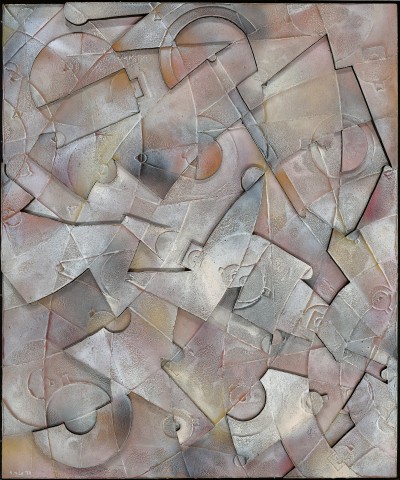ZONE II, 1974
ASHER BILU
polyvinyl butyral resin and pigment on board
183.0 x 152.0 x 4.5 cm
signed and dated lower left: A. BILU 74
signed on backing board verso: ASHER – Bilu
Tolarno Galleries, Melbourne
The National Australia Bank Art Collection, acquired from the above in 1975 (label attached verso)
Asher Bilu. Recent Works, South Yarra Gallery, Melbourne, May – June 1974
The Seventies: Australian Paintings and Tapestries from the Collection of National Australia Bank, National Gallery of Victoria, Melbourne, 15 October – 28 November 1982
SpaceTime, Asher Bilu, Macquarie University Art Gallery, Sydney, 7 March – 27 April 2012
‘Bulletin Briefing’, The Bulletin, Sydney, vol. 96, no. 4909, 8 June 1974, p.61
Lindsay, R., The Seventies: Australian Paintings and Tapestries from the Collection of National Australia Bank, The National Bank of Australasia, Melbourne, 1982, pl. 10, p. 23 (illus.)
Asher Bilu online catalogue raisonné [http://asherbilu.com/paintings/paintings-1970-79/] (accessed 12/1/22)
Zone I, 1973, polyvinyl butyral resin and pigment on board, 92.0 x 110.0 cm, private collection
The following excerpt is from Lindsay, R., The Seventies: Australian paintings and tapestries from the collection of National Australia Bank, National Bank of Australasia, Melbourne, 1982, p. 23
Zone II 1974 demonstrates, with its experiments in surface texture and spatial manipulation plus the use of the circular rhythms to organize the abstract structure of the work, Asher Bilu’s continuing concern for a symbolic representation of the cosmos – ‘The cosmos has become’ he said in the early 1960s ‘a reality and awaits the artist who will communicate its full wonder to us.’1 He has experimented with different surface textures and effects, often adding a variety of materials to the paint or charring the paint surface with a blowtorch to achieve an organic molten planet-like surface evoking connotations of primordial creation and galactic cosmos. After building up the surface textures of his works on a single base Asher Bilu began, during the 1970s, to create low-relief works in which various free-form elements were overlapped, raised and lowered in relation to each other. In Zone II the circular patterns and lines echo the cyclic rhythms of the universe where the various orbits of the planets trace overlapping paths and provide a structuring model for this work.’
1. Artist’s statement in Reed, J., The New Painting 1952 – 1962 Oxford University Press, Melbourne, 1963, p. 47
